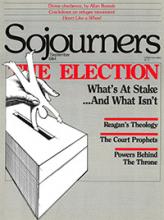For anyone in this country who is committed to working for peace and social justice, a presidential election year can be a very frustrating time. On the one hand, the quadrennial campaign frenzy provides the one time in this most unpolitical culture when public attention is actually focused on great public questions such as war and peace, human rights, and the direction of the economy. This at least gives activists a potential foot in the door to have our views heard. But that opportunity is often outweighed by the fact that, in an election year, public debate inevitably comes down to the very narrow terms of reference defined by the two major parties. Social analysis is reduced to, "Who are you for?" and moral considerations consist only of weighing the fine calibrations of greater and lesser evils.
Historically Christians committed to applying the gospel publicly have responded in at least two very opposite ways to this election-year bind. At one end of the spectrum, the main emphasis is on being relevant and, it is hoped, effective. Toward that end many Christian activists simply locate which candidate or party shows the most commitment to social justice (even marginally) and then jump into the fray feet first on that side.
At the other pole of response, the primary emphasis is on being consistent and, it is hoped, faithful. Some Christians steadfastly refuse the logic of the lesser evil. Believing that government (or this government, or perhaps any existing government) is inherently violent and oppressive, they counsel non-cooperation with evil, often to the point of refusing to vote. Versions of this view can be found in both the historic Anabaptist and more recent Catholic Worker traditions.
Read the Full Article

